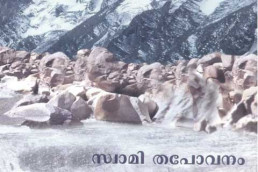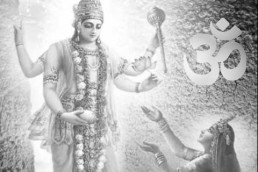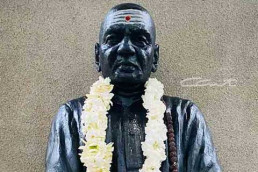By V. PANOLY
The way to mount Kailas was long and lonely; it was touched by eternal silence. The rough path, seldom trodden by human feet, was winding through relentless rocky stones that often disturbed the skin of the bare foot. The quiet regions which are not frequented by worldly men are often visited by monks and sadhus. One day, through this lonely region, a monk was going for the darshan of Mt. Kailas. He walked and walked, till the rays of the sun fell perpendicular on his bare head. There was a combined attack on the skin of his bare feet by the uncompromising rocky path underneath and the penetrating rays of the sun from above. But the monk knew nothing of these, for his flesh was not weak, nor was he under its sway. He tirelessly traversed until all his nerves got heated and disarranged on account of the non-stop march to the horizon. But did he feel all these? No, he knew naught; he was walking beyond time. He walked, and walked again, till his throat became dry and lips parched. Still he did not lose balance. How strange! Anyone else would have fallen down and broken into pieces in such circumstances. But he did not, for he had such an unflinching faith in the Lord – a faith that could move even mountains.
He stopped and looked around. There was no trace of mankind anywhere within the reach of his eyes. He was a wandering monk, and in this barren region, which men did not generally frequent, whom should he ask for food or help or shelter? He stopped abruptly as if he had a flashing darshan of the Lord in front of him, and in a mild, but compelling tone, he said, “O Lord, mercy is Thy name and Thou hast shown this, Thy devotee, Thy boundless mercy, often unasked. Thou hast fed this sevak of Thine through unknown hands and made his parched lips move even in deserts, and this humble self, sevak of Thy sevaks, becomes speechless when he ponders on Thy mysterious and amazing ways. Hah! Soul of my soul, mercy incarnate, how wilt Thou save this child of Thine, here and now, for his body is fading and falling, while his energy bids farewell to him.”
He had preached often to his devotees about the ineffable mercy of the Lord, for he himself had felt it beyond all doubts. Besides, the shruti (Vedas) also proclaims that ‘the Lord sees without eyes and hears without ears’. So he was sure that every word his lips uttered would reach God and He would come to his succour. His body was fatigued due to hunger. But who will offer him food in that silent abode of snow, devoid of human habitation? “Hah! Lord, how wilt Thou save Thy child here and now,” came again the sigh from him.
“Halt,” someone cried from behind. He halted and looked back. A form concealed in a thick blanket was steadily and quickly moving towards him. Wah! Is God appearing in the guise of a bhikshu to help him? Or is it only an illusion? The form in the thick blanket paced quickly. He had a beard as all sadhus generally have in that region of mountains and from within the covering of the blanket, the faint colour of geruva cloth (kashaya) was also visible. Is he a bhikshu? No, he cannot be a bhikshu, for his look was dreadful. And more dreadful than his look, was the sight of the dagger he held in his hand. Who is he? None other than a dacoit! He had been chasing this monk from a long distance. He was a specialist in cheating and his chosen hobby was to rob sadhus and saints, monks and mendicants of course, not of their spiritual wealth. Had he attempted it, he would not have continued to exist as a dacoit for long! He used to watch from a convenient spot pilgrims moving through the region of mountains and he used to make hay, not when the sun shines, but when the sun sets because by that time the yatris would be retiring somewhere, and he would conduct a wild raid in all the camps with the natural cooperation of darkness that would stretch its helping hand to him even unasked. But with this solitary traveller, he played his game in the open daylight, exhibiting no patience for the sun to set or the night to come. Here the monk was going alone, and so, without losing time, he chased him.
At a convenient spot, the monk stopped, and the dacoit also stopped. The ferocity in the face of the dacoit was sharper than that of the dagger’s shining edge.” Hah! Lord, how dost Thou save this, Thy sevak, here and now in this mountainous region, cut away from all human habitation, when his body is fading and falling due to hunger and tedium!” With this prayer, the monk stood facing the dacoit, whose brow became immediately clouded with disappointment, for till then, he had taken this monk for a wealthy merchant pilgrim because of the attractive shawl he had covered himself with. “What is your possession? What money have you in your pocket? Show me, you thief!” roared the dacoit. “Money! I do not own any. Possessions, I have none,” the monk replied. The dacoit felt deceived. He was not the least satisfied with the reply, nor did he believe in this utterance of the monk, which to him was a deliberate lie. He, a dacoit of dacoits, would not easily get hoodwinked by such gospels and gossips of saints and sadhus. He examined the monk from head to foot, from shoulder to fingers, even as a police officer would examine a criminal, for what do these dacoits care for the decades of penance and meditation of monks? Finally, the dacoit felt deceived. “What a stupid thoughtless sadhu you are!” exclaimed the dacoit. “Animals like you are mere weights on this earth,” he murmured. “You are not even fit to be included among animals, because no animal ever forgets his stomach and hunger, but you have forgotten it and taken nothing with you in this long travel to feed your stomach. Silliness and thoughtlessness cannot go any further,” he continued. “At least now, come and share half of my food which I have been thoughtfully carrying in my bundle all along.” Saying this, he opened his bundle of boiled potatoes and gave just half of it to the monk. The monk accepted it and ate his fill and also drank some water from the stream nearby.
The dacoit went his way to conduct his raid on other ‘thoughtful’ fellows by robbing whom he would lose no portion of his potatoes! The monk continued his journey saying, “Our Lord, mercy is Thy name and Thou hast shown this to Thy devotee. Thy boundless mercy often comes unasked. Thou hast this day sent food to this sevak of Thine, in a region cut away from human habitation, through a robber! Hah! Soul of my soul, I know Thou seest without eyes and hearest without ears!”
The reader might perhaps wonder who this mysterious monk was. He was none other than Swami Tapovanamji Maharaj. This miracle happened in his life many years ago and I heard it described by one who held Swamiji Maharaj in high esteem. And I reproduce it here because I believe in the gospel of “Man’s faith and God’s mercy.” This miracle should be written in golden letters, because it is not every day that one hears such a story as this that really happened, where man has turned the cruellest of dacoits into the most merciful of mortals, not by sprinkling half an ounce of sacred water on his head, but by dint of absolute faith in the Lord, faith in himself, and faith in all others, including dacoits.
Previous Topic
Tapovanam-The Hermit Poet
Sri T.N. Kesava Pillai who translated Swami Tapovanam's Malayalam book Himagiri Vihar into English, shares some of the…
Next Topic
Para Bhakti
The experience of the pure Brahman, is pure devotion – Parā Bhakti, says Swami Tapovan Maharaj. Originally written in…
Home Page
Homage to Sri Swami Tapovanam
The 50th anniversary edition of Tapovan Prasad (December 2011) was entirely dedicated to our Paramaguru Swami Tapovan…


